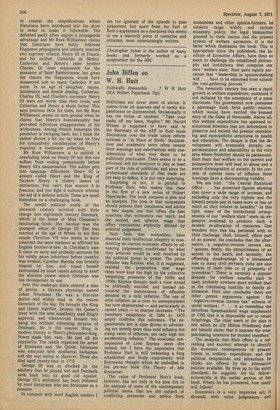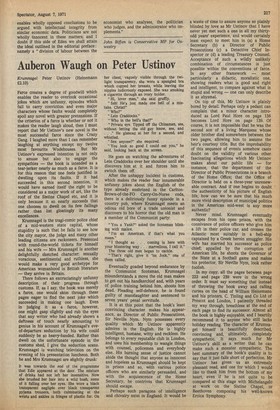John Biffen on W. H. Hutt
Politically Impossible . . .? W H Hutt (IEA Hobart Paperback 75p) Politicians are never short of advice. It comes from all quarters and is rarely dispassionate or disinterested. Occasionally it has the virtue of candour. "Take your tanks off my lawn, Hughie," Mr Harold Wilson is supposed to have said to the Secretary of the AEF in their tense discussions over the trade union reform outlined in 'In Place of Strife.' Businessmen and academics more often temper their warnings and exhortations with considerations of what they deem to be politically practicable. There seems to be a universal itch for everyone to play at least part of the role of politician; and since the professional standards of that trade are not easy to define, it is not very surprising.
Surprising or not, it is painful to Professor Hutt, who makes this clear in the first of a new series of Hobart Paperbacks. The book contains a plea and an analysis. The plea is that economists should present their conclusion and advice in two stages; one that offers the best solutions that economics can teach, and the second, and inferior, stage that offers conclusions explicitly diluted by political judgement.
Hutt feels that economists have deserted their intellectual integrity in commenting on current economic affairs by advancing judgements conditioned by what they believed would be well received by the political group in power. The prime offender was Keynes, who, it is suggested, resisted the proposition that wage rates were kept too high by the collective bargaining pressures of the 1920s and 1930s. Keynes thought such a view would be politically suicidal, and instead advocated the maintenance of effective demand by a mild inflation. The use of mild inflation as a cure to unemployment has now degenerated — and particularly in recent years — to sharper increases. "The monetary experience of 1958 to 1970 amply confirms this inference. The expansionists are in time driven to advocating not merely more than mild inflation but rising rates of inflation, not only high but accelerating inflation." The economic consequences of Lord Keynes seem dire indeed; but I have the impression that Professor Hutt is still treasuring a long established and lively controversy with Keynesian thought which he embodied in his pre-war book The Theory of Idle Resources.
The value of Professor Hutt's book, however, lies not only in his plea but in his analysis of some of the contemporary political issues that are the subject of conflicting pressures and advice from
economists and other opinion-formers. he subjects range widely and include monetary policy, the legal immunities granted to trade unions and the present system of welfare payments. It is the latter which dominates the book. This is appropriate since the publishers, the Institute of Economic Affairs, have done so much to challenge the established philosophy and institutions that comprise our own 'welfare state.' Hutt quite rightly perceives that "leadership in opinion-making will . . have to be exercised from outside the vote-gathering process."
The twentieth century has seen a rapid growth in welfare expenditure, sustained if not initiated by the emergence of a mass electorate. The government now possesses a patronage fund, from public sources, which would have excited the keenest envy of the Duke of Newcastle. Above all, this welfare expenditure has spawned institutional interests that are determined to preserve and extend the present centralizing and monopolistic structures in health and education. The danger is that the development will eventually atrophy experimentation and adaptability in the very area where flexibility should be paramount. Hutt fears that welfare on the current and prospective level will lead to abuse and a moral disintegration of society. In the context of current rates of inflation these warnings have a disconcerting validity.
We are told : "the Central Statistical Office . . . has presented figures showing that (over a wide range of incomes, and excluding only the very highest and the lowest) people pay in taxes more or less as much as they receive in benefits." In this light, many of the institutional arrangements of our 'welfare state' seem an expensive overhead to promote such a modest re-allocation of resources. One wonders why this has persisted with so little challenge. Hutt, himself, offers part of an answer. He concludes that the alternative, a negative/reverse income tax, "ignores, firstly, the attractiveness of an appeal to the heart, and secondly, the offsetting disadvantage of a threatened loss to many civil servants (who are also voters) of their jobs or of prospects of promotion." There is certainly a popular distaste for welfare benefits paid in cash, probably nowhere more evident than in the continuing hostility to family allowances. Hutt also concludes there are other potent arguments against the negative/reverse income tax' scheme of social welfare : " . . . it so resembles the notorious Speenhamland wage supplement of 1795 that it is impossible not to retain misgivings. The chief merit of the plan is one which he (Dr Milton Friedman) does not himself claim: that it exposes the votepurchasing incentive for income transfers."
The analysis that Hutt offers is a ref reshing and succinct attempt to identify the economic consequences of present
trends in welfare expenditure, and the political temptations and attractions he thinks are offered by the alternative policies available. He lives up to the strict standards he suggests for his fellow
economists in the earlier section of the book. Where he has pioneered, how manY will folloW?
Economics is a very imprecise art; it abounds with value judgements and enables wholly opposed conclusions to be argued with intellectual integrity from similar economic data. Politicians are not wholly innocent in these matters; and I doubt if this side of Eden we shall attain the ideal outlined in the editorial preface : namely a "division of labour between the economist who analyses, the politician who judges, and the administrator who implements."
John Biffen is Conservative MP for Oswes try



































 Previous page
Previous page